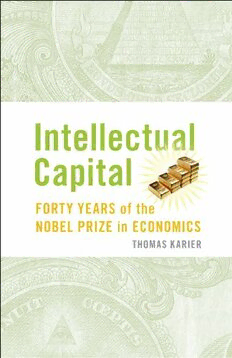
Intellectual Capital: Forty Years of the Nobel Prize in Economics PDF
367 Pages·1.586 MB·English
Most books are stored in the elastic cloud where traffic is expensive. For this reason, we have a limit on daily download.
Preview Intellectual Capital: Forty Years of the Nobel Prize in Economics
Description:
There is arguably no award more recognized in the academic and professional worlds than the Nobel Prize. The public pays attention to the prizes in the fields of economics, literature, and peace because their recipients are identified with particular ideas, concepts, or actions that often resonate with or sometimes surprise a global audience. The Nobel Prize in Economic Science established by the Bank of Sweden in 1969 has been granted to 64 individuals. Thomas Karier explores the core ideas of the economic theorists whose work led to their being awarded the Nobel in its first 40 years. He also discusses the assumptions and values that underlie their economic theories, revealing different and controversial features of the content and methods of the discipline. The Nobelists include Keynesians, monetarists, financial economists, behaviorists, historians, statisticians, mathematicians, game theorists, and other innovators. Rich in biographical details, illuminating the modern history of the discipline as a whole, Intellectual Capital allows an audience of lay and professional readers to readily understand the notions that define modern economic science and practice. It pointedly asks, and answers, whether the prizes have been awarded to those economists "who have during the previous year rendered the greatest service to mankind."
See more
The list of books you might like
Most books are stored in the elastic cloud where traffic is expensive. For this reason, we have a limit on daily download.
